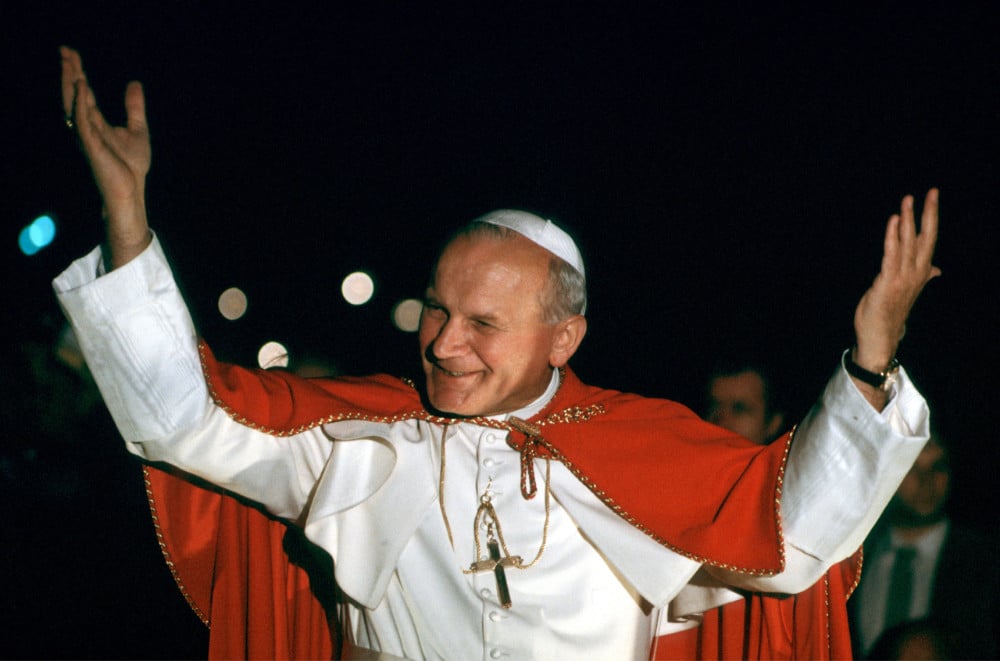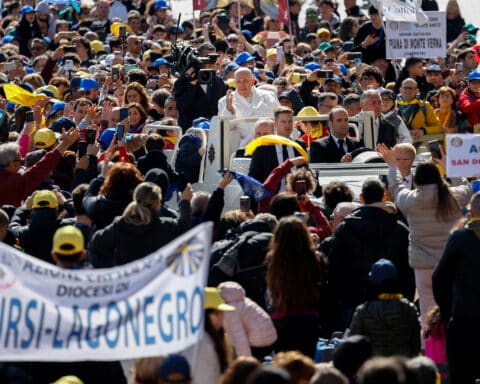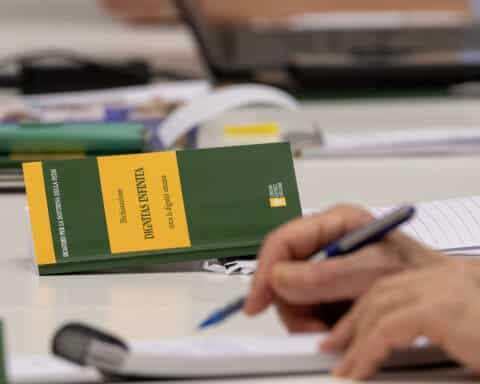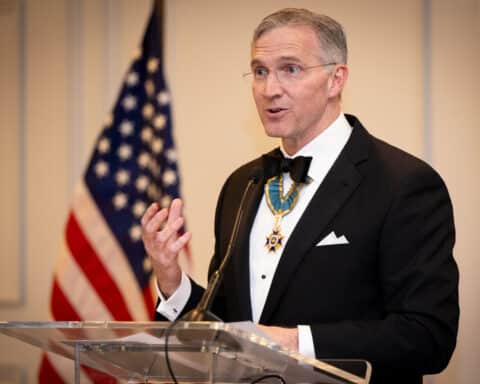Many people have wondered what Jesus meant by “Be perfect as your heavenly Father is perfect” (Mt 5:48). How can a human being be perfect as God is perfect? The original Greek word teleios is helpful; it means being ordered to one’s end or goal. St. Teresa of Calcutta was helpful, too; she often paraphrased the verse as “Be holy as your heavenly Father is holy.” She knew that humanity’s goal is communion with the Holy Trinity, and “getting there” (made possible for us by Jesus) involves yielding to God’s will, or as the poet, George Mackay Brown writes, “To lose one’s own will in the will of God.” Yielding to God, we share more and more in his holiness. We become holy as he is holy. We begin and end in him.
Christifideles Laici (“On the Vocation and the Mission of the Lay Faithful in the Church and in the World”), Pope John Paul II’s 1988 apostolic exhortation, takes up the call to holiness as it applies specifically to laypeople. It seems that an unfortunate notion has, at times, circulated among laypersons that they cannot be as holy as the so-called professional religious. Even some Church documents have referred to laypeople in what Pope John Paul II calls negative terms: laypeople were defined by what they could not do instead of by their unique contribution to the life of the Church and society (cf. Christifideles Laici, No. 9).
Read more from our Church Documents series here.
Pope John Paul II reminds the reader of Christifideles Laici that all members of the Church — clergy, religious and laity — share a radical equality and dignity. Moreover, each member shares in the Church’s mission, which is evangelizing the world so that every human being may experience salvation in Christ and have the “hope of future glory” (No. 14). The roles of the Church’s members vary based on individual vocations, but Pope John Paul II outlines the “essential and irreplaceable” part that the lay faithful have in announcing and testifying to the Gospel of Jesus (No. 7).
Context
Christifideles Laici was written as a reflection following the Seventh Ordinary General Assembly of the Synod of Bishops (Oct. 1-30, 1987). The bishops of the world, with the pope, revisited the vocation and mission of the laity, which had been such a prominent topic at the Second Vatican Council. Many laypeople participated in the synod as auditors, and they shared their thoughts with the general assembly. For the first time, a lay woman and man were appointed as adjunct special secretaries. Pope John Paul II relied on the 54 propositions of the General Assembly to compose Christifideles Laici.
Content
In Christifideles Laici, Pope John Paul II views the laity (and, really, the whole Church) from the perspective of their relationship to Jesus, who is the head of the Church (cf. No. 28). The pope uses Jesus’ images of a vineyard (cf. Mt 20:4) and branches on a vine (cf. Jn 15:1-17) to demonstrate where a person’s vocation and mission originate and flourish: It is Christ himself, as he says, “I am the vine, you are the branches. … Without me you can do nothing” (Jn 15:5).
All members of the Church become so through baptism, which makes them children of God the Father in Christ, members of Christ’s body and temples of the Holy Spirit (cf. Nos. 10-14, 19). The baptized share (again, through Jesus) in the gift of life and love of the Holy Trinity, and they are called to live this communion and communicate it by participating in the threefold mission of Christ: priest, prophet and king (cf. Nos. 9, 14). Participation in this mission is deepened through confirmation and strengthened through the Eucharist. The other sacraments contribute to the continual healing (anointing, reconciliation) and service (holy matrimony, holy orders) of the community.
Although all members share in Christ’s threefold mission, they do so in a manner unique to their vocation. Clergy and religious realize their participation primarily from within the Church, even though they evangelize the world, too, by their witness. The clergy’s “ministry is fundamentally ordered to the service of the entire People of God” (No. 22). The laity, on the other hand, although they are certainly involved with the life of the Church, have as their place of mission the secular dimension of society, where they live and work and raise their families (cf. No. 15). In other words, as priests, prophets and kings in Christ, the laity share the fruit of their communion in the Church with the people they encounter in their daily lives.
Generally speaking, laypeople manifest the priestly office of Christ by asking the Holy Spirit to unite themselves and their daily activities to Jesus’ sacrifice. In this way, they contribute to consecrating the world to God. The prophetic office includes proclaiming the Gospel in word and deed, allowing it “to shine out every day in their family and social life” (No. 14) and express their hope in heaven. The kingly office involves anticipating on earth the kingdom of heaven by overcoming sin in oneself and in society through service to all with justice and charity, especially toward the least and most vulnerable.
The laity can fulfill their mission, however, only when they remain in the communion of the Church, which Pope John Paul II says cannot be understood “as simply a sociological or a psychological reality” (No. 19). The bonds that unite the members of the Church are “not those of ‘flesh and blood’, but those of the spirit” (No. 19).
It’s in the communion of the Church that members receive the life of Christ and are able to communicate it to the world. At the same time, being in communion includes also being a part of the community (in its several manifestations: the universal Church, the diocese and, most directly, the parish). The laity use their gifts and charisms, which often include expertise in secular matters, for building up the Church on earth, and, at the same time, they avoid the pitfall of clericalization by taking on only those roles rooted in baptism and confirmation (the Sacrament of Orders pertains to the clergy).
Having been fed and enriched within the communion of the Church, the lay faithful are prepared for their “essential and irreplaceable role” in the Church’s mission: to make Christ “present in the various sectors of the world” (No. 7). Again, every layperson is called to this mission: young and old, men and women, those who are sick and those who are healthy. Moreover, the variety includes natural gifts and occupations. However, Pope John Paul II lays the stress on “being Christians, even before actually doing the works of a Christian” (No. 55). This does not mean that earthly and temporal realities are insignificant. Quite the contrary, they are part of God’s salvific plan, too. But Christ will be perceived in the manner laypeople live their specific vocations and their common call to holiness. In a word, they are to love as Christ loves (cf. No. 55).
Call
Given the tremendous gifts of God that he bestows on his people through Christ and the communion of his Church, laypeople are called to be a leaven in society to “contribute to the sanctification of the world” (No. 15). Beyond the common call to holiness, each human being is called by name by the Good Shepherd (cf. No. 58). Therefore, each one must discern one’s particular vocation and mission, which brings us back to God’s will. Pope John Paul II offers a good method to use for this task:
“To be able to discover the actual will of the Lord in our lives always involves the following: a receptive listening to the Word of God and the Church, fervent and constant prayer, recourse to a wise and loving spiritual guide, and a faithful discernment of the gifts and talents given by God, as well as the diverse social and historic situations in which one lives.” (No. 58)
No doubt, if one follows the advice of the pope here, one will have peace in the discernment process. But should one need more assurance, Pope John Paul II recommends following the advice Mary gave to the servants at the wedding of Cana who were waiting to hear from Jesus: “Do whatever he tells you” (No. 58; cf. Jn 2:5).
David Werning writes from Virginia.





